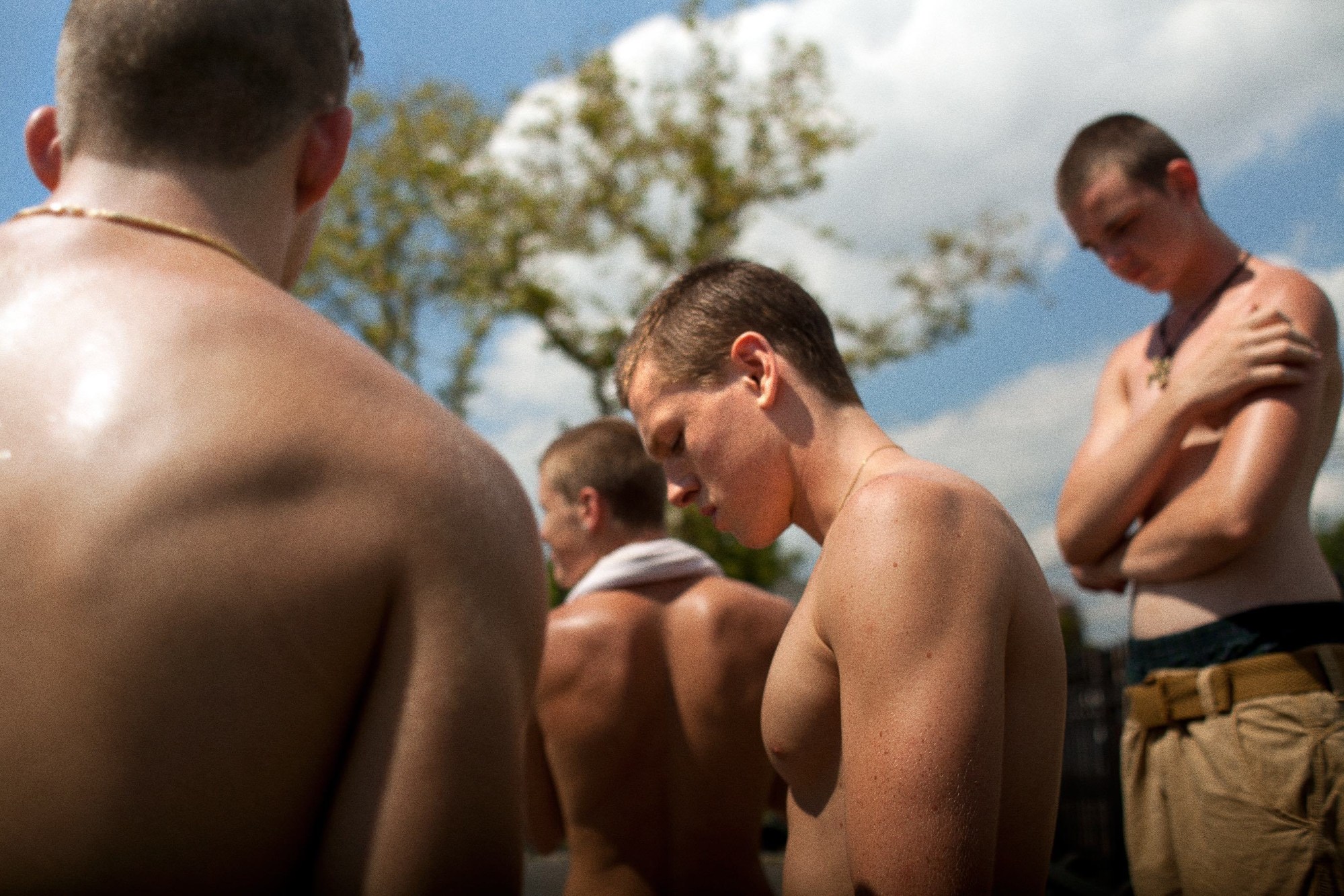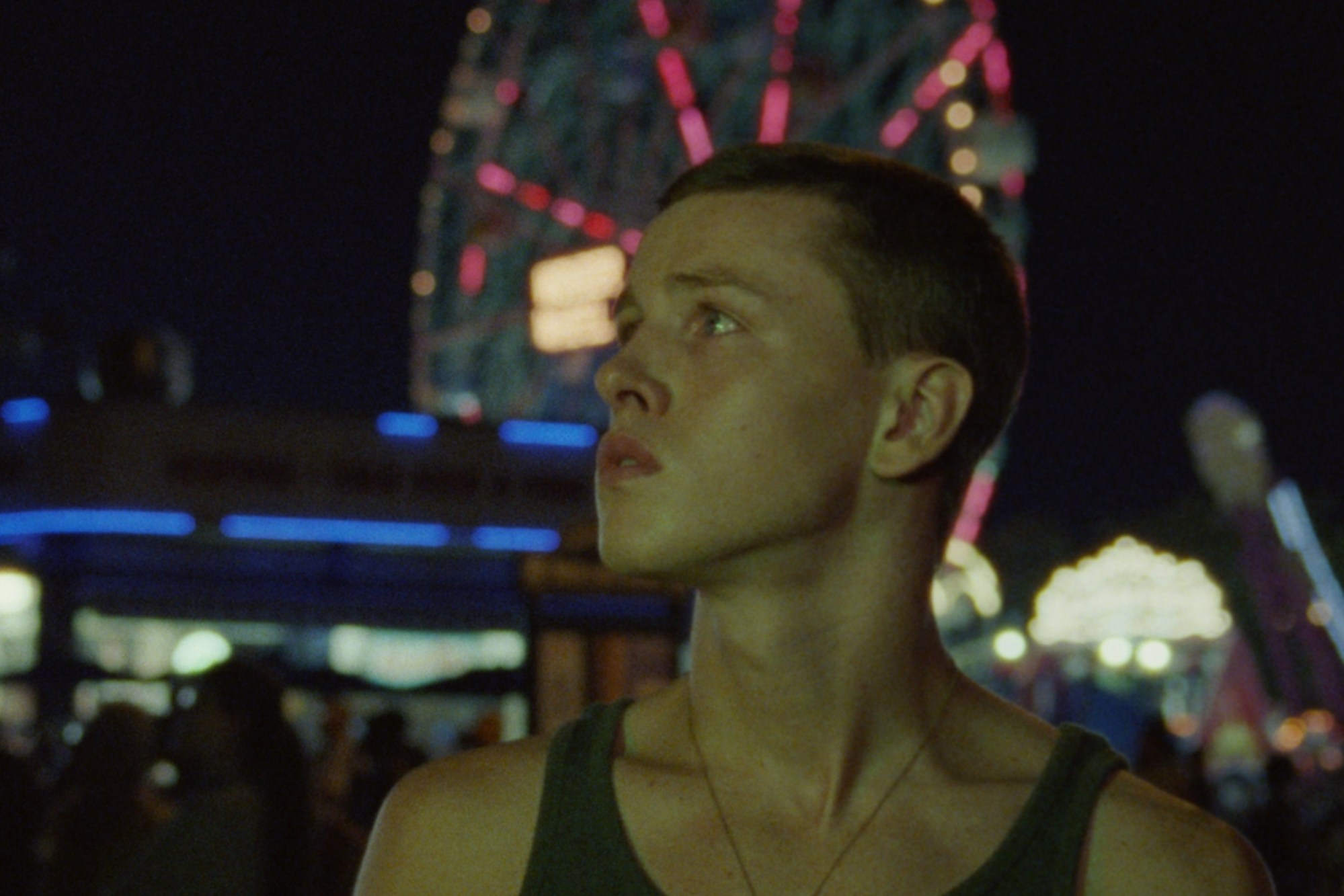“I treat a sex scene almost like I would treat a fight scene,” says director Eliza Hittman about her second film, Beach Rats. And indeed, there’s nothing conventionally erotic about the shadowed, claustrophobic close-ups on protagonist Frankie’s after-dark liaisons with much older men. Instead, they unfold like cage fights under a dying strobe light: harsh, cold, and cathartic.
The film is a piercing look at adolescence that won Hittman the Directing Award at this year’s Sundance Film Festival. In a version of South Brooklyn that feels like equal parts Larry Clark and Andrea Arnold, 19-year-old beach bro Frankie wanders around in a drug-, grief-, and ennui-induced haze. He spends his days visiting his terminally ill father and trolling the Coney Island boardwalk with his rat pack of stoner buddies. When girls hit on him, he responds with the same disaffected attitude he uses for everything else. The only time he shows any sign of vulnerability is late at night, when he cruises hook-up sites for older guys, admitting to them he has no idea who, or what, he wants.
Hittman, a former theater buff born and raised in Brooklyn, made waves in 2013 with her first feature It Felt Like Love, another slow-burn indie about a teenager from her home borough who discovers the volatile relationships between sex, autonomy, and power. The film, about a 14-year-old girl who pursues an older guy, made the Critic’s Picks in The Village Voice and The New York Times. Hittman is now an assistant professor of film and video at the Pratt Institute, but her teenage years still provide creative fodder for her films: “There are themes that I coped with as an adolescent that are part of the work that I make, like an ill or dying parent…[or] a family member sort of figuring out their sexual identity,” she says. “Those are things that are loosely, loosely drawn from my own experiences, but not directly trying to create an autobiographical story.”
Ahead of the film’s release, we speak to Eliza about her enduring love for teen movies, why Beach Rats isn’t a coming-of-age story, and how the obsession over its sex scenes totally misses the point.
You’ve done two films about adolescence now, the first being 2013’s It Felt Like Love. What draws you to the stories about this age specifically?
As a film-watcher, I never, never get tired of watching movies that explore youth and the representation of youth. I also just really love working with young actors, because I feel that you’re able to find and locate an honest performance in a way that sometimes is trickier or more challenging with adults. You just kind of point the camera at them and feel all of their vulnerabilities. I think teenage years and adolescence are very formative for all of us, in the way that how we navigate them defines who we become as adults.
What sort of truths were you drawing from to tell Frankie’s story so genuinely?
With Beach Rats, I was just interested in trying to write a male protagonist, [an] anti-hero–he’s sort of similar to Lila [the protagonist of It Felt Like Love] in that he’s kind of an aggressor and kind of a victim – and trying to create a similar but more extreme character who is responding to a lot of pressures in their environment. Lila is also coping with all these very heteronormative expectations and trying to be a certain kind of woman, and having a certain kind of female coming-of-age story, but she’s sort of forcing the whole thing. That similar character I wanted to find in a male protagonist. When I was shooting It Felt Like Love, we were shooting along the water, [and] I saw that there was still a lot of cruising happening, and one guy in the parking lot kind of checked out our male actor and that resonated with me as something that I could explore.

I read in another interview that you don’t consider Beach Rats a coming-of-age story…
Yeah, I think it’s more like “coming-of-consciousness.” That’s how I think about them. Because there’s no familiar, knowable message at the end of the story. It’s more experiential, versus preaching something about the experience. And they come out of it with a realization about themselves and the world and their pain in that discovery, versus happiness. I always think that a kind of, quote, “coming-of-age” narrative sort of implies this butterfly transformation.
You had a lot of trouble getting Beach Rats made early on when people dismissed it for all the sexuality, but when I was watching it that just felt like one of many things Frankie was struggling with. Do you think people still distill teen narratives to just focus on the sexuality?
I think so. There’s obviously a marketing angle, and even in how this film is being marketed, it talks a lot about the sex. But I feel like even though there is sex and there is nudity, it’s not really erotic. I mean, it isn’t for me. Even though the film gazes upon [Frankie’s] body a lot, there’s a tension to it, and it’s not about arousing an audience. And I always feel like the sexuality I’m interested in is intensified by some sort of dread or tension, that something bad just happened. So it’s always playing with this space between sex and horror almost, versus creating these romantic or romanticized or erotic or pleasurable sexual experiences for an audience. My characters don’t really have a sense of their own worth in the world, and they’re putting themselves in situations that could backfire. I feel like that’s a lot about what my experiences were growing up. I never had, like, a perfect suburban high school romance.

Speaking of ways in which Beach Rats deviates from the average teen film, were you intentionally subverting some coming-of-age tropes, like the meet-cute on the boardwalk under the fireworks?
It was intentional and I sort of did it with both films. Thinking about the teen movie that bills this perfect kiss, getting the guy. With It Felt Like Love, it was like you don’t want her to have that sexual experience in a way, when you’re watching it, and with [Beach Rats], it’s like in a way you don’t want him to come out, because you know that the world’s not going to accept him for who he is. Or maybe it would, but it was going to be challenging. So just playing with those expectations and then flipping them upside down.
How did you and cinematographer Hélène Louvart settle on the film’s distinctive aesthetic?
A lot of our stylistic choices came from scouting together alone on the beach at night and watching people cruise, actually. We just sort of watched people disappear into darkness. And we thought a lot about how to preserve that feeling of darkness around the character, because he’s really confronting something that he perceives as a darkness within himself.
This interview has been edited and condensed.

Credits
Text Evelyn Wang
Trailer via YouTube
Stills courtesy Eliza Hittman and Neon
